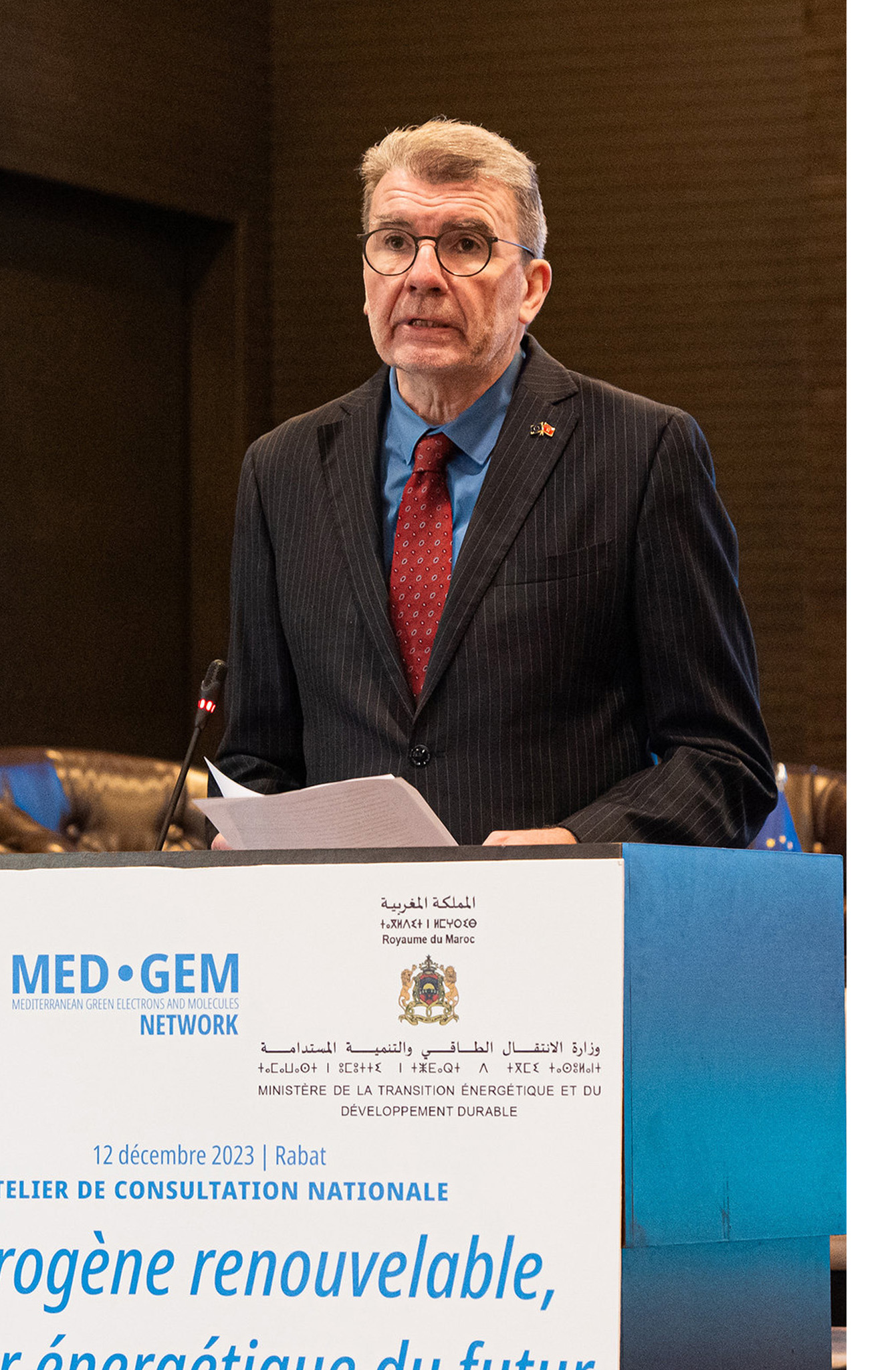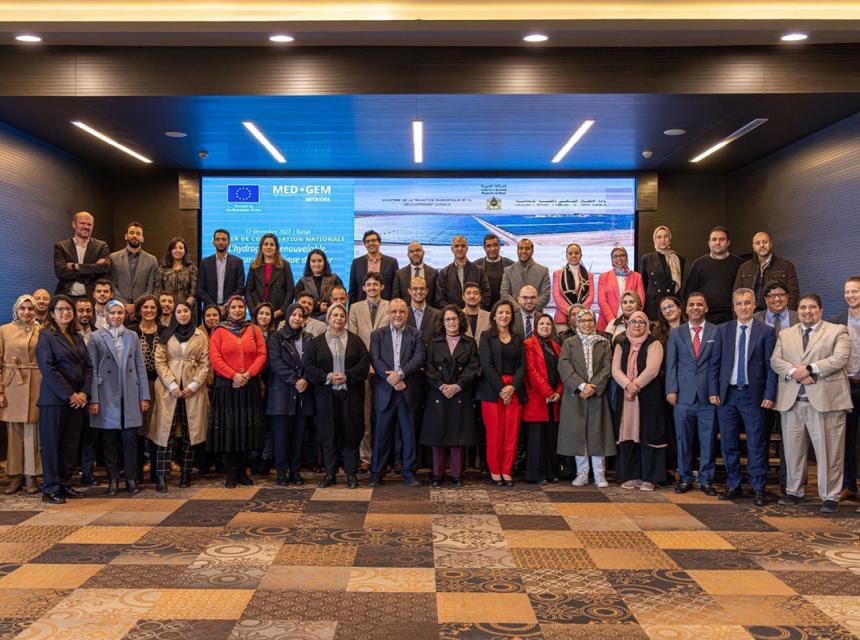Renewable Hydrogen, Future Energy Vector!
Harmonizing Policies, Regional Cooperation, and Development of Bankable Projects to Attract Investments: Success of the EU-Morocco National Consultation Workshop on 'Renewable Hydrogen: Future Energy Vector!'
Rabat, December 14, 2023 – We reflect on the promising outcomes of the National Consultation Workshop on "Renewable Hydrogen: Future Energy Vector," held in Rabat on December 12 and 13. The event was organized by the Directorate-General for Neighborhood and Enlargement Negotiations (DG NEAR) of the European Commission, through the "MED-GEM Network," in collaboration with the Ministry of Energy Transition and Sustainable Development (MTEDD). This two-day "Think and Do Tank" brought together national and international experts to discuss strategies, challenges, and opportunities related to renewable hydrogen, positioning Morocco at the heart of a crucial global dialogue.
The day commenced with a solemn opening session featuring welcome speeches from Mohammed Ouhmed (Director of the Directorate of Renewable Energies and Energy Efficiency at MTEDD), Jean-Christophe Filori (Head of Cooperation at the Delegation of the European Union to Morocco), and Frank Wouters (Director of the MED-GEM Network). Mustapha Taoumi, Principal Expert of the MED-GEM Network, outlined the ambitious goals of the workshop, emphasizing the need for international collaboration to advance renewable hydrogen.
The first session, moderated by Mustapha Taoumi, delved into regulations and support programs for the production and use of renewable hydrogen. Discussions covered EU ambitions, Moroccan legal frameworks, and local initiatives in the renewable energy sector.
The second session, led by Frank Wouters, focused on value chains and infrastructure necessary for renewable hydrogen, featuring presentations on regional projects, the impact of research and innovation, and insights into priority infrastructures.
The afternoon's third session, dedicated to financing hydrogen development, explored financial resources, support mechanisms, and public-private partnerships. Presentations from the European Investment Bank (EIB) and the European Bank for Reconstruction and Development (EBRD) highlighted innovative financing approac
The National Consultation Workshop continued on December 13 with a Training Seminar focusing on policy, regulation, standards, and certification for the development of renewable hydrogen, emphasizing perspectives and case studies around the Mediterranean.
The discussions over these two days resulted in recommendations for the future, underscoring the importance of harmonizing policies and regulatory frameworks, regional cooperation, and the development of bankable projects to attract investments in the renewable hydrogen sector.
These two days align with the implementation of the Green Morocco-EU Partnership launched in October 2022 and extend the European Commission's financial commitment to supporting Morocco's energy transition. As announced in the recent Joint Declaration on December 3, 2023, during COP28, a new European program "Supporting the Energy Transition in Morocco – Green Energy" with a funding of 50 million euros was introduced.
Statement by Mohammed Ouhmed, Director of the Directorate of Renewable Energies and Energy Efficiency at MTEDD:
 "The Kingdom of Morocco and the European Union have established a strong strategic partnership based on a shared vision with concrete actions and ongoing dialogue. The National Consultation Workshop on Renewable Hydrogen is a new opportunity to strengthen this partnership. Morocco and the European Union have been committed to a green partnership since October 2022, and the energy transition and decarbonization of the economy are key sectors of our joint action plan. The development of renewable energy and green hydrogen is at the core of our partnership and is a priority for both Morocco and the European Union (…) »
"The Kingdom of Morocco and the European Union have established a strong strategic partnership based on a shared vision with concrete actions and ongoing dialogue. The National Consultation Workshop on Renewable Hydrogen is a new opportunity to strengthen this partnership. Morocco and the European Union have been committed to a green partnership since October 2022, and the energy transition and decarbonization of the economy are key sectors of our joint action plan. The development of renewable energy and green hydrogen is at the core of our partnership and is a priority for both Morocco and the European Union (…) »
(…) Despite its low responsibility for climate change, the Kingdom of Morocco has raised its greenhouse gas emission reduction target to 45.5% by 2030. This approach aligns with our sustainable development vision, based on three essential pillars: increasing renewable energy, strengthening energy efficiency in various sectors, and regional integration. We are proud of the tangible achievements on the ground, with a total capacity of 4.5 gigawatts already operational, significantly contributing to our electricity production. Morocco's dependence on external sources has decreased remarkably, dropping from 97.5% to 80-90%. We have also launched strategic measures to accelerate the energy transition, including increasing additional renewable energy capacity, strengthening the electrical grid, and developing flexibility means.
Green hydrogen is a top priority for us, and studies have confirmed that Morocco has competitive advantages to play a major role in the development of this industry. Our geostrategic position near Europe, expertise in renewable energies, potential for renewable energy, internationally standardized port infrastructure, and potential for local use of green molecules make us a key player.
I emphasize the importance of cooperation between Morocco and the European Union, manifested through concrete actions at COP28. We are determined to strengthen our partnership for a successful energy transition, creating economic opportunities and respecting the environment."
Statement by Jean-Christophe Filori, Head of Cooperation at the Delegation of the European Union to Morocco:
 "The National Consultation Workshop on Green Hydrogen in Rabat is part of the EU-Morocco Green Partnership and marks an important step in cooperation between the European Union and Morocco on this central topic for decarbonizing our energy systems. Morocco, with its carbon neutrality strategy by 2050 announced at COP28, positions itself as a leader in this energy transition and in the development of renewable hydrogen. Renewable hydrogen represents a vast opportunity for economic growth in the region, which can strengthen trade, industrial, and energy relations between Europe and its Mediterranean neighbors. It can play a key role in job creation and socio-economic development, especially in Morocco.
"The National Consultation Workshop on Green Hydrogen in Rabat is part of the EU-Morocco Green Partnership and marks an important step in cooperation between the European Union and Morocco on this central topic for decarbonizing our energy systems. Morocco, with its carbon neutrality strategy by 2050 announced at COP28, positions itself as a leader in this energy transition and in the development of renewable hydrogen. Renewable hydrogen represents a vast opportunity for economic growth in the region, which can strengthen trade, industrial, and energy relations between Europe and its Mediterranean neighbors. It can play a key role in job creation and socio-economic development, especially in Morocco.
Within the European Union, we are making rapid progress on the green hydrogen front, with the adoption of ambitious goals and a revised regulatory framework. We have launched a first pilot auction and are actively preparing the first list of hydrogen infrastructure projects in Europe. We also intend to increase the volume of green hydrogen imports by 2030. The Mediterranean region, with its solar and wind potential, is clearly identified as a strategic corridor for transporting this hydrogen.
The European Union, aware of the importance of this energy transition, has just launched a new "Green Energy" program with a substantial endowment of 50 million euros, emphasizing our commitment to supporting Morocco's energy transition and climate ambitions. We look forward to further strengthening this cooperation and sharing our European expertise with Morocco in the months to come."
Statement by Frank Wouters, Director of the MED-GEM Network:
"With the MED-GEM Network, we have brought together over 80 key figures from the public and private sectors, and European funders around the same table. Discussions focused on the multiple opportunities offered by the use of green hydrogen; through industrialization and deepening of local value chains, Morocco can stimulate innovation and reduce dependence on energy imports. Moreover, we can seize export opportunities to balance the country's trade and contribute to the decarbonization of Europe and Morocco. With its exceptional solar, wind, and human resources, Morocco ranks among the top three countries in the southern Mediterranean neighborhood in terms of green hydrogen production costs. Additionally, its proximity to Europe offers the possibility of exporting green hydrogen through pipelines."

